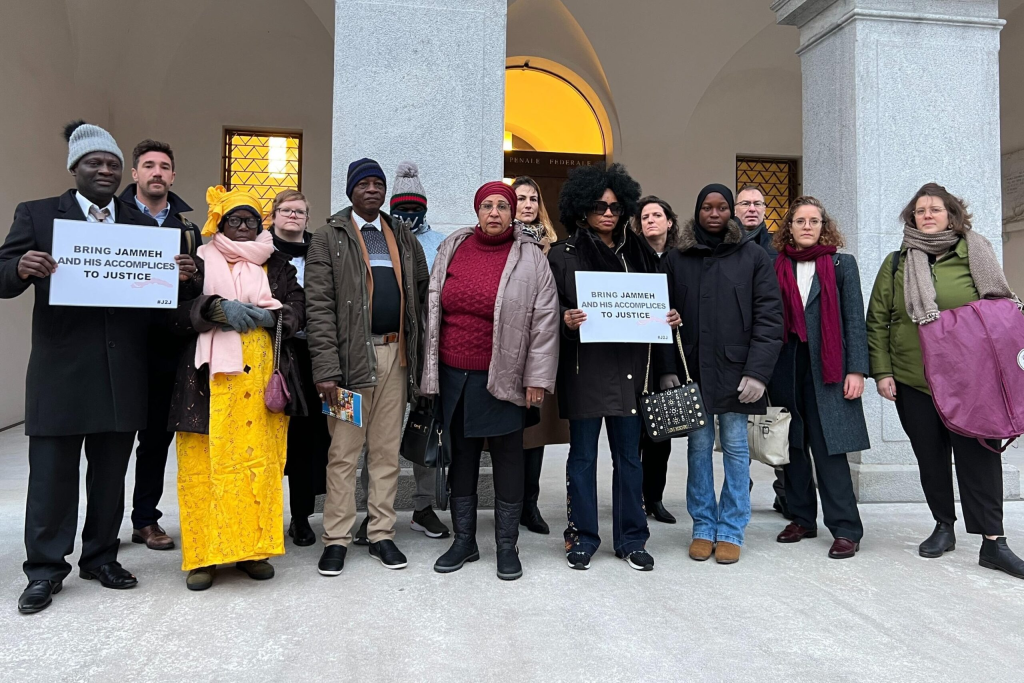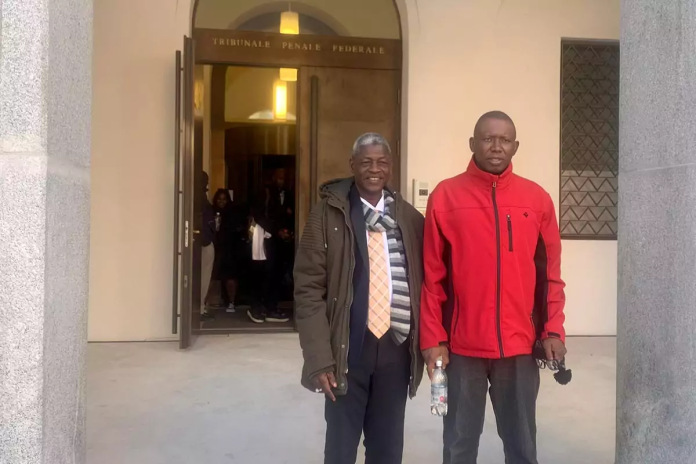
Eleven witnesses have testified in the trial of Ousman Sonko, a former Interior minister of The Gambia accused of crimes against humanity before a Swiss court. Evidence covered alleged sexual violence, two murders, the brutal repression of 2016 opposition protests – and, finally, that of a 2006 coup attempt. But instead of hearing the closing arguments, the court agreed to reconvene in March.
In March 2006 several members of the army, politicians, and civilians were arrested for their alleged involvement in what was commonly known in The Gambia as the Ndure Cham coup. This was a failed coup attempt led by Colonel Ndure Cham, who was the Chief of Defense Staff at the time. Ndure Cham managed to go into hiding for over six years, before he eventually ran out of luck, and was killed by the “Junglers”, the country’s leader Yahya Jammeh’s hit-squad, in 2013. Those arrested went through unlawful interrogations before a panel at the National Intelligence Agency (NIA) led by representatives of the police, the military and the NIA. They were tortured. And 18 years later this is part of the case against Ousman Sonko, a former Interior minister of The Gambia, who is being tried for crimes against humanity in a Swiss court: several witnesses who testified before the Gambian Truth, Reconciliation and Reparations Commission (TRRC) a couple of years ago mentioned Sonko as a member of the panel that conducted their interrogation. At the time Sonko was Inspector General of the Police.
Lieutenant Colonel Bunja Darboe, a soldier in the Gambia National Army, was the second witness to testify before the Federal Court of Bellinzona. Darboe, a military assistant of Ndure Cham, was arrested on March 21st 2006, subjected to gruesome torture, unlawfully detained and forced to write and read out a false statement on national television regarding the coup.
“The Junglers were the ones who arrested me. Manlafi Corr, Nuha Badjie, all these people were part of the Junglers. Even Ousman Sonko knew that. He knew they were part of Junglers. They arrested me and they also picked up Bora Colley [another Jungler] on the way,” Darboe told the court.
WHO HAD AUTHORITY ON THE JUNGLERS?
Darboe was picked up from Mile 2 prison a number of times and brought before the interrogation panel. Then he was brought before an “independent witness” to sign a statement he was allegedly forced to write. This “independent witness” was Babou Loum. Loum testified before the TRRC, and he had a long back and forth argument with the Commission’s lead counsel for his lack of cooperation. It appeared he had served as an “independent witness” in the interrogation of other witnesses linked to this coup. “Mr. Witness, you cannot recall all of them because they were too many!” the TRRC lead counsel slammed Loum during his testimony, accusing him of having a deal with the state to serve as a professional disingenuous witness.
But the part of Darboe’s testimony that the defence lawyer was more keen on was his knowledge of the existence of the Junglers, which he spent some time questioning him about. He put it to Darboe that when asked by the TRRC whether the existence of the Junglers was known in the army, he had responded “of course, the Junglers were known.”
“I did not [say] they were not known. They were trained as commandos. But personally, my encounter with them happened in 2006. That’s what I said,” corrected Darboe.
“In 2006 what measures could an Inspector General of the Police (IGP) could have taken?” asked Philippe Currat, Sonko’s lawyer.
“The IGP is not responsible for the Junglers but as a member of the panel he is the one who gives instructions to the panel.”
TORTURE AND RAPE
Demba Dem, a lawmaker for Jammeh’s party, was also arrested for his alleged involvement in the coup. He was arrested at the National Assembly. “I would say kidnapped from the National Assembly,” Dem told the court. “The reason I say kidnapped is because arresting is not done that way.”
After Dem narrated his victimisation and torture, the defence lawyer asked him what measures he took as an MP to end torture. “In the Yahya Jammeh era, you dare not to say it. You are not so crazy to say it in parliament,” the witness replied.
“I have never been arrested in my life. That was the first time,” another witness said before taking a deep breath. “They put plastic bag over my head. They removed my glasses and they started whipping me all over directions. When they see your hand going like this [dropping], they remove [the plastic bag] and give you two seconds and they put [it] back, ” she said. This victim, whose identity is protected, also said she was raped by a masked man, a Jungler she cannot identify. Sonko denied seeing the witness at the panel. “When I first saw him [the accused], he was in a full police uniform as the inspector General of Police. There is no doubt that I recognised him like I recognise the others because they were all in uniform,” the witness testified.
CONNECTING THE POLICE TO THE NIA
Both the general manager Madi Ceesay and editor-in-chief Musa Saidykhan of The Independent, a bi-weekly newspaper, appeared in court. In March 2006 they were arrested by the Police Intervention Unit and subsequently handed over to the NIA, where they were tortured. Their 22-day detention was said to have been in connection with publication of false information about the involvement of Samba Bah, a former deputy director of the NIA, in the failed coup. Tumbul Tamba and Musa Jammeh were the soldiers who tortured the two journalists. “They are soldiers from the president’s office. They are called the Junglers. But later we realised that some of the Junglers were recruited from the Police Intervention Unit – which tells you that there is a coordination,” Saidykhan testified. “I know the two of them were soldiers,” said Ceesay. “I don’t really know under what authority they were acting. But to me, since I was handed over to them by the police, I hold the police responsible. Why would they hand me over to them?”
In 2016, Ceesay’s son, a journalist, was covering the United Democratic party protest. He was also arrested and detained. “What they were telling him during torture is that ‘your father was here in 2006, we will beat you to death’. He died months after his detention. I really don’t think I can go far into that,” Ceesay told the court.
Saidykhan told about his risky journey to Senegal after his detention, with a 6-month pregnant wife. “I am somehow blind on my left eye. I was in and out of the hospital, especially in 2014. Even in the past year, I was in and out of the emergency room mainly because of torture I went through. Psychologically it’s a problem because the nightmares keep coming.”

SONKO DENIES RESPONSIBILITY
Sonko denied leading the interrogation panel where these witnesses were questioned and tortured. “I am confirming that Momodou Hydara was the head of the panel. He was heard during the pre-trial hearings and he confirmed that he was the head of the panel.” (Hydara was not called as a witness in the case.) Sonko said that he joined the panel on 21 March 2006, but that he knew nothing about Darboe’s arrest because it was done by the Gambian Armed Forces. “I did not read any statement that was written by Bunja Darboe,“ he added, although Darboe said he did.
When asked if he saw Demba Dem’s injuries, Sonko replied that Dem had said before the TRRC that the day he was tortured, he did not see any of the members of the panel. “So if he did not see any of us, I’m not supposed to see his injuries.”
Both Ceesay and Saidykhan testified that Sonko was present at the interrogation panel at the NIA. Though the accused did not explicitly deny this, he said he could not remember. “It could be possible but I have no recollection.” He told the court that the journalists were not arrested by the police. “Madi Ceesay told the TRRC during his hearing that he was arrested by agents of the National Intelligence Agency. I would want to make this distinction between the Banjul Police and the Police Headquarters. Although the Banjul police was located on the down floor of the police headquarters, it operates independently from the police headquarters,” he then claimed strangely. “According to Musa Saidykhan,” the accused argued, “when the deputy Inspector General of Police learnt of their detention at the Banjul police, he called them upstairs. He asked them why they were there and promised that he was going to find out why.” The accused was reminded that the journalists had testified that the deputy IGP wanted to release them but said he did not have the power to. “He said he had to ask the people from the top,” the presiding judge added.
Reacting to Ceesay’s statement on how the government used the police to terrorise people, the accused said: “To say that the government terrorised the people is not a fair statement. I think the police was the most respected force in The Gambia because most of the police stations we have were built by private citizens and not the government.” He insisted that the press was free under the Jammeh regime. “If he [Jammeh] was not tolerant of the press, he would not have built a school of journalism,” Sonko argued.
A SHORT TRIAL NOT ENDING JUST YET
Eleven witnesses have testified in the case against Sonko. On January 23, the defence submitted a character witness affidavit by the ex-wife of Sonko, Nyemeh Bah, a journalist, who has been attending the trial since its second week. The statement was not made public. The court was then set to start hearing the closing arguments. However it granted a request to postpone them to March.
“We have already heard all the people that were supposed to be heard during this main hearing. We have heard a lot of things during this two weeks and a half and I have noted that some of the plaintiffs have changed their previous statements in the proceedings to direct them to Sonko. Especially [among those] who have been heard very early in 2017 – that means before the TRRC started. And what was clear is that for all of them, torture happened at the NIA. Torture was done by NIA agents or by the Junglers and at the very beginning of the proceedings, we had no idea of who these people were. We had no particular idea how the NIA was organised and who was responsible for what. But the different plaintiffs understood that there was no link between what they suffered and Sonko. And this is why they tried to create that link,” the defence lawyer told Justice Info in an interview after the last hearing on January 23.
Before adjourning, the President of the court informed Sonko that should he be found guilty and sentenced, the court would consider deporting him to The Gambia. The accused said his lawyer would address this issue in the closing arguments.


